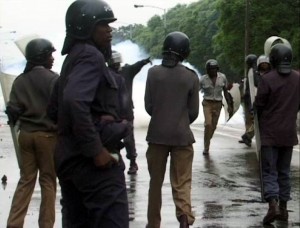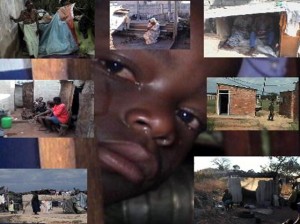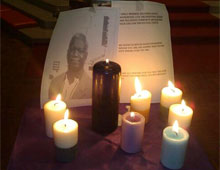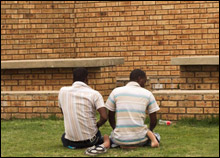
Report Cover Photo: Zimbabwe Republic Police
“Policing the State” highlights the growth of police brutality in Zimbabwe since 2000, which has coincided with the rise of the democratic challenge to the State. During the 1990s, peaceful protest by the student movement and trades unions was tolerated to some degree, but after the forming of the Movement for Democratic Change and the loss of the February constitutional referendum in 2000, State repression escalated in all respects. The Zimbabwe government has reverted to patterns of State control established under colonialism, including mass arrests in terms of repressive legislation, combined with brutality against civilians. (Read more…)
Thu, December 14 2006 » Human rights, Impunity of the State, Justice system, Reports » Leave a comment
Zimbabwe is a nation whose last one hundred years of official history and policy stand as an example of how to ensure that truth and peace do not prevail.
During the last three decades in particular, there has never been a period of sustained peace or genuine reconciliation to the past. We are a nation with a history of unresolved conflicts, including racism rooted in colonialism, and ethnic conflict, which predated and was intentionally exacerbated by colonialism. We are a nation with a poor tolerance of political diversity and a leadership that is committed to never leaving power voluntarily. In the last 40 years, this country has had only two political leaders – Ian Smith, from 1964 until 1979, and Robert Mugabe – from 1980 until the present. Both leaders have ruled more or less in the context of a one party state, and have become embroiled in civil wars to destroy legitimate alternative political voices.
Political repression has been compounded throughout the decades by a pattern of unjust laws and impunity for perpetrators. Sadly, in the post-colonial peace accord era that began in April 1980, there was no concerted, formalised attempt to allow truth telling or to promote reconciliation between the three warring parties – ZANU, ZAPU and the Rhodesians . There was also no comprehensive attempt to repeal laws infringing civil liberties. Zimbabwe remained, in fact, in a State of Emergency from 1965 until 1990, with all the super-legal powers to state officials that this entails. (Read more…)
Wed, September 13 2006 » Conflict resolution, Essays, History, Transitional justice » Leave a comment

Report Cover Photo: Operation Murambatsvina
Between 1991 and 2003, urban poverty trebled in Zimbabwe. It was against this background of escalating economic collapse and social disintegration that “Operation Murambatsvina” (OM), or “Discarding the Filth”, took place in mid 2005. In the space of a few weeks, 700,000 people lost their homes and/or livelihoods in a process that the UN has referred to as “indiscriminate and unjustified”. More than two million others suffered related losses as a result of the demolitions.
One year on, this report assesses the state of meltdown. The situation on the ground remains dire. Fifteen months later, almost nothing has been done to house those who lost homes and livelihoods, or to salvage the informal trading sector – either by the Zimbabwean government, or by the international community. (Read more…)
Wed, August 30 2006 » Access to resources, Human rights, Operation Murambatsvina, Reports » Leave a comment
HOT SEAT INTERVIEW: Part Three of the ‘Hot Seat’ programme in which SW Radio Africa’s Violet Gonda talks with Professors Brian Raftopoulos, Jonathan Moyo and Economist John Robertson.
Violet: Welcome back to our teleconference with three people who have at one time or another been advisors to some key political players. Analyst Professor Brian Raftopoulos who has been one of the advisors to the MDC, Mugabe’s former strategist and ex- information minister Professor Jonathan Moyo – a man more renowned for being the architect of much of the oppressive media regulation in the country – and last but not least, leading economist John Robertson. In this program we discuss more about the issue of international engagement and what the international community can do about the crisis in Zimbabwe.
Mugabe always blames the economic crisis on sanctions imposed by western governments, ignoring the fact that they are targeted sanctions, designed not to impact on ordinary Zimbabweans. I first asked John Robertson if he thought economic sanctions, as described by Mugabe, were in place? (Read more…)
Tue, June 27 2006 » Interviews » Leave a comment
HOT SEAT INTERVIEW: Transcript of ‘Hot Seat’ programme in which SW Radio Africa’s Violet Gonda talks with Professors Brian Raftopoulos, Jonathan Moyo and Economist John Robertson.
Violet: We continue the teleconference interview discussing various issues of national interest with three people who have at one time or another advised some of the key players in Zimbabwean politics – political analyst Professor Brian Raftopoulos, former Information Minister, now independent MP Professor Jonathan Moyo and leading economist John Robertson. This week we are going to be discussing how Mugabe thinks. What is his mindset? Why is he allowing the country to collapse so totally? A huge part of that collapse has been economic and so we start this week’s discussion with the economy.
With inflation nearing 1200% it’s been said the economy has become Mugabe’s real opposition. So I first asked economist John Robertson to explain the state of the economy and tell us how bad things really are.
Robertson: The state of the economy is certainly extremely serious. We have lost about half of our gross domestic product. The GDP per capita has come down to less that US$1 per day for the population as a whole and at that level we have, I am afraid, a very debilitated population. I think many, many people are suffering malnutrition and because of the treatment and the various little security measures taken by the government we have also a traumatised population. Which might explain why they have not taken mass action to date. There was some evidence of courage to do that back in 1997/ 98, but the treatment that was meted out to the people after that has left them very, very cautious and very anxious not to have that experience again. (Read more…)
Tue, June 20 2006 » Interviews » Leave a comment















